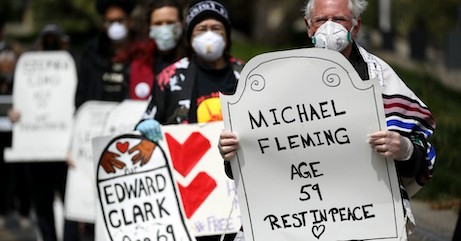Covid-19 Deaths in US Prisons Have Risen by 73% the Past Month After months of warnings that the coronavirus pandemic has turned U.S. detention facilities into "ticking time bombs" and a "nightmare waiting to happen," the New York Times reported Tuesday that deaths related to Covid-19 in prisons across the country have soared by 73% since mid-May. "The number of prison inmates known to be infected has doubled during the past month to more than 68,000" while the national daily infection rate "has remained relatively flat," according to data the Times has collected since the virus reached the U.S. "By now, the five largest known clusters of the virus in the United States are not at nursing homes or meatpacking plants, but inside correction institutions." Fred Roehler, a 77-year-old inmate at a California prison with chronic inflammatory lung disease and other respiratory issues, told the newspaper that Covid-19 is "like a sword hanging over my head... Any officer can bring it in." The Times reported that "a muddled, uneven response by corrections officials to testing and care for inmates and workers is complicating the spread of the coronavirus," and the risk of the situation getting worse "appears imminent," given that law enforcement has responded to a nationwide uprising against police brutality and systemic racism by locking up protesters in cramped holding pens at local jails. Dr. Homer Venters of Community Oriented Correctional Health Services, a group that works to improve healthcare in jails, told the Times that "we have really no true idea of how bad the problem is because most places are not yet testing the way they should." While Texas has started testing every inmate for Covid-19, fewer than 2.5% of inmates have been tested in the Alabama, Illinois, and Mississippi prison systems. New York has tested only about 3% of the state's inmates, and over 40% have come back positive. "I think a lot of times some of the operational challenges of either not having adequate quarantine policies or adequate medical isolation policies are so vexing that places simply decide that they can just throw up their hands," said Venters, a former chief medical officer of the New York City jail system. Although some state prison systems have been more proactive about testing, the Centers for Disease Control and Prevention recommends only testing inmates with symptoms of Covid-19. The Times database shows "prisons that have conducted mass testing have found that about one in seven tests of inmates have come back positive," and the "vast majority" of inmates with positive tests have been asymptomatic. Testing is only one part of what is needed in jails, prisons, and immigrant detention centers to tackle the virus—effective containment policies are also essential. In April, experts at the Brennan Center for Justice at New York University Law School warned that "those in our correctional facilities suffer cramped and unsanitary conditions, increasing the spread of contagious diseases behind bars," and urged U.S. governors to:
"There is a human tragedy unfolding all around us in our nation's jails and prisons, and that is the callous use of torture as a first, second, and final response to Covid-19," Jessica Sandoval of Unlock the Box said in a statement. "As this special report demonstrates, solitary confinement creates an atmosphere of fear and mistrust that prevents sick people from reporting their symptoms, and puts incarcerated people, correctional officers, and local communities at greater risk from Covid-19." "Rather than developing a comprehensive plan that would take at-risk people out of correctional facilities," Sandoval added, "officials at the federal, state, and local level are reversing years of hard fought human rights gains by dramatically increasing this uniquely American form of cruel and unusual punishment." Source URL |
